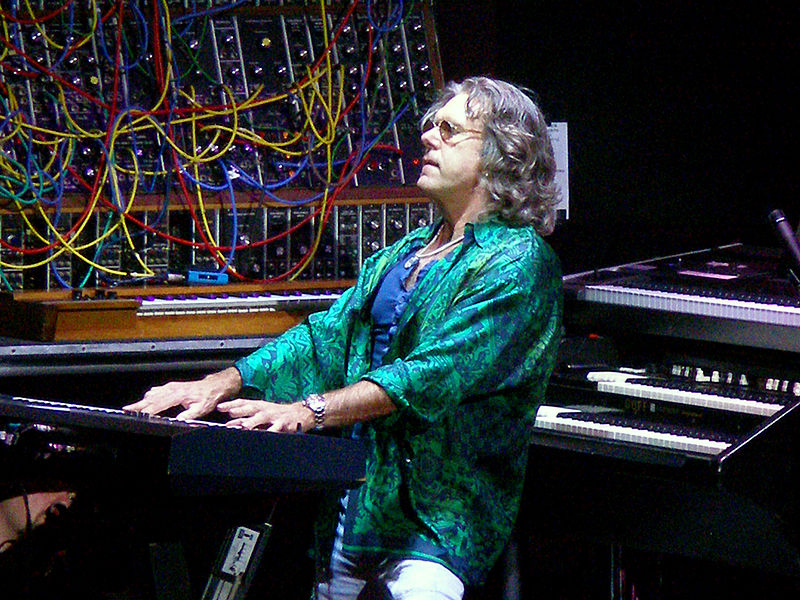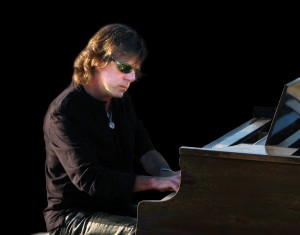
 Progressive Rock keyboard virtuoso Keith Emerson died of a self-inflicted gunshot wound at his apartment in Santa Monica on March 11. Emerson, who was most famous for his musical tenure in the Nice and Emerson, Lake and Palmer, redefined the parameters of playing keyboards through his work on the Hammond B-3, Moog Synthesizer and standard piano while fusing Rock, Jazz and interpretations of classical pieces by such renowned composers as Copeland, Bartok and Mussorgsky.
Progressive Rock keyboard virtuoso Keith Emerson died of a self-inflicted gunshot wound at his apartment in Santa Monica on March 11. Emerson, who was most famous for his musical tenure in the Nice and Emerson, Lake and Palmer, redefined the parameters of playing keyboards through his work on the Hammond B-3, Moog Synthesizer and standard piano while fusing Rock, Jazz and interpretations of classical pieces by such renowned composers as Copeland, Bartok and Mussorgsky.
Progressive Rock in the 1970s featured bands like the aforementioned Emerson, Lake and Palmer, Yes, Genesis, Gentle Giant, and groups like Kansas and Styx who skirted the line between that genre and hard rock. These bands and so many others displayed expert musicianship, played long pieces, that were in essence classical movements and utilized expert improvisation that wowed audiences. The standard bearers for this sometimes criticized style of music (by three chord Punk aficionados) were Emerson, Lake and Palmer. The band featured Keith Emerson on a multitude of keyboards, Greg Lake on vocals, bass and guitar and Carl Palmer on the drums and Gong. What set this band apart from all of others, along with Yes, is that each musician’s ability in the band stood out in a live setting and on studio albums.
The term Supergroup became popular after Cream debuted in 1966 with guitarist Eric Clapton (formerly of The Yardbirds and John Mayall’s Bluesbreakers) and bassist Jack Bruce along with Ginger Baker, who were former members of the Graham Bond Organization. In a similar way, ELP’s three members had tremendous musical pedigree before the band’s formation. Emerson had been a member of The Nice, whose version of Leonard Bernstein’s “America†from Broadway’s “West Side Story” was a Progressive Rock tour-de-force and sowed the seeds of Emerson’s sonic explorations on the keyboard that would be part of ELP’s signature sound. Greg Lake had been a member of King Crimson and his vocals were featured on their classic “In the Court of the Crimson King.†Last, but far from least, Carl Palmer’s embryonic days in music were spent with The Crazy World of Arthur Brown (“Fireâ€) and Atomic Rooster. It was a forgone conclusion that this trio would go on to create music history.
From the start, ELP set new standards at every turn. From their gigs at The Isle of Wight Festival of 1970 and the California Jam (1974), in front of Woodstock type crowds, to their recordings, ELP rewrote the roadmap to rock stardom. Their band-titled 1970 debut features “The Barbarian,” a reworking of Bela’ Bartok’s 1911 piece, “Allegro Barbaro.†The album also contains “Take a Pebble, with a jazzy piano passage,” “Knife Edge†with its incredible dynamics and the closing track, “Lucky Man,” a piece that Greg Lake wrote at age 12. What distinguishes “Lucky Man†beyond its brilliant songwriting and top-notch vocals is Keith Emerson’s Moog synthesizer solo at the end of the song. Immediately, ELP became a household name and a cut above other offerings at that time.
Other brilliant albums followed, like Trilogy, Tarkus, Pictures at an Exhibition and Brain Salad Surgery,which pushed ELP to the upper strata of the rock pantheon with “Karn Evil 9†making rock history with 23 minutes of Progressive Rock brilliance. A 1977 tour with an orchestra, though wonderful to witness,signaled a death knell for the band.The underappreciated Love Beach, Black Moon and In the Hot Seat followed which were not of the same quality as previous ELP fare, though they had their moments of brilliance. Acrimony ensued and the trio broke up. Though an album with Cozy Powell on drums followed, the classic lineup never recorded again. Emerson later released solo albums with the help of Marc Bonilla’s exquisite guitar work, scored movie soundtracks and made appearances, but his star dimmed.
On a personal note, I was lucky enough to get the chance to interview all three members of ELP at different times and with Emerson’s untimely death, my interview with him in 2010 has a special relevance to me. The interview was conducted with Emerson, who was on the phone from his hotel room. He was interesting, sincere and humble. I was later given a ticket to see Emerson and Lake at the Nokia theater on April 8 later that year and was blown away. This show led to Emerson, Lake and Palmer reuniting to headline the High Voltage Festival in England in the summer of 2010 and putting on a stirring concert. Though fans clamored for a tour and album, it never was to be. We will never see Keith Emerson’s like again. He will be remembered as a Beethoven, Bach or Mozart of our time. His fluidity on the keyboard as he traversed all styles of music with virtuosic bombast will never be equaled.
There are reports that Emerson had been suffering from depression for many years and that a nerve problem in his hand made his mood darker on the heels of a projected tour of Japan. The fact that he took his life should never diminish the legacy of his music.

Leave a Reply